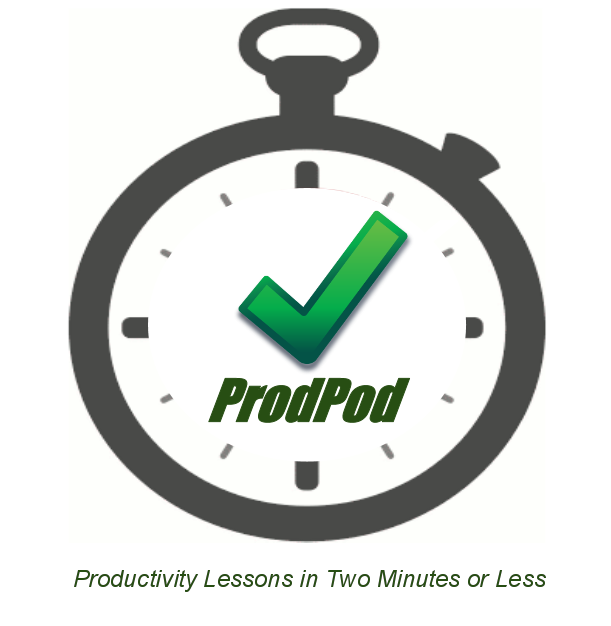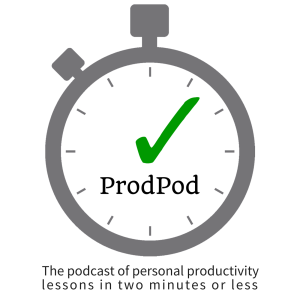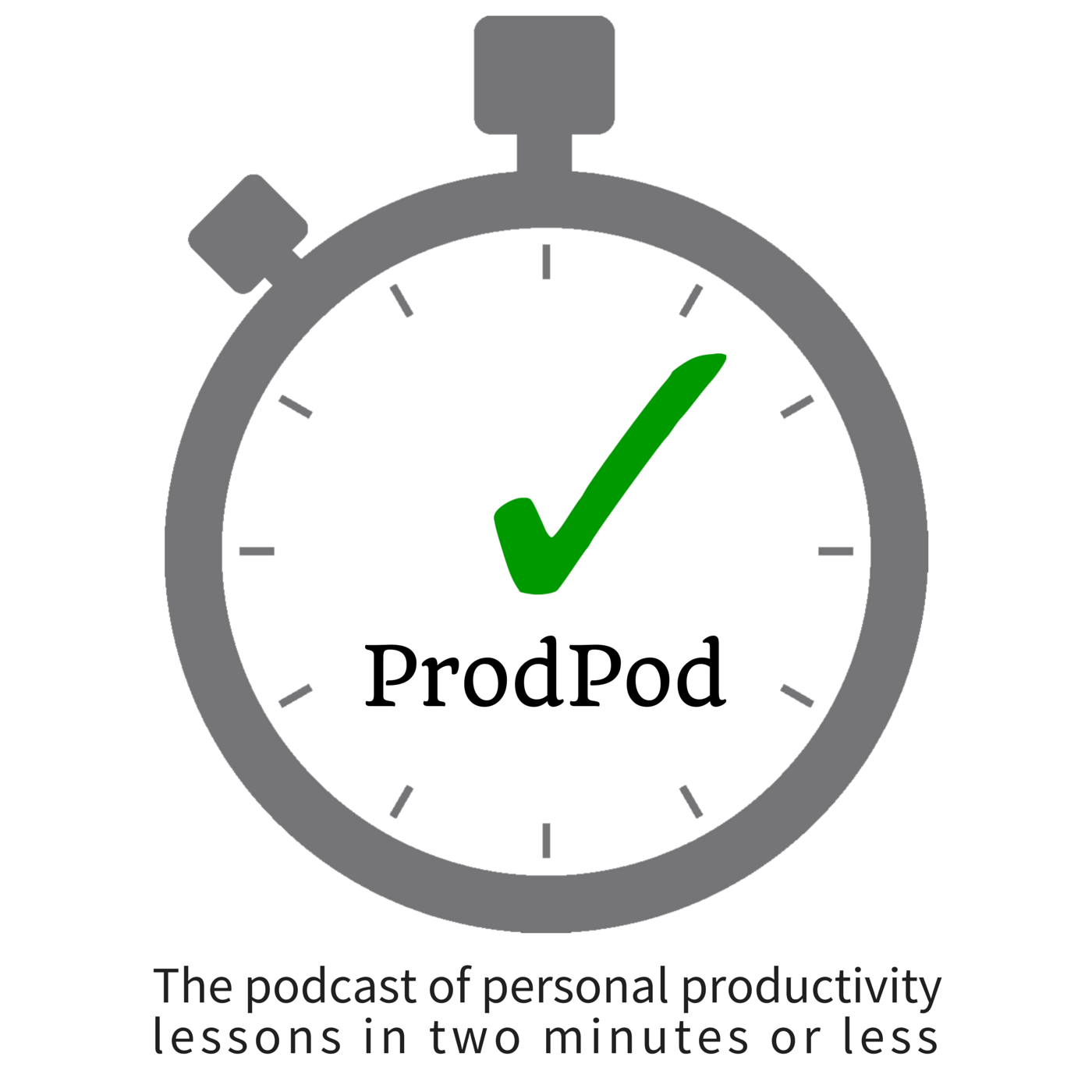Episodes

Thursday Mar 28, 2013
ProdPod: Episode 61 — Personal Life Action Negotiation (PLAN), Part Two
Thursday Mar 28, 2013
Thursday Mar 28, 2013
In episode 60, I presented an introduction to a personal development plan, but for your personal life, called the Personal Life Action Negotiation (with the acronym, PLAN). In this episode, I'll cover three guidelines for an effective PLAN.

Wednesday Mar 27, 2013
ProdPod: Episode 60 -- Personal Life Action Negotiation (PLAN), Part One
Wednesday Mar 27, 2013
Wednesday Mar 27, 2013
I'm developing a personal life planning tool called the Personal Life Action Negotiation (with the appropriate acronym, PLAN). In this episode, I explain the reasoning and overview. In episode 61, I give the general guidelines for creating a PLAN that works for you. Enjoy!

Tuesday Mar 19, 2013
ProdPod: Episode 59 -- Habit
Tuesday Mar 19, 2013
Tuesday Mar 19, 2013
I came across this poem (who's author is unknown to me) several years ago and I think it's definitely worth sharing. If you haven't yet listened to Episodes 12 to 15 on habit development, go check those out after listening to this episode. Enjoy!
Habit
I will push you onward or drag you down to
failure.
I am completely at your command.
over to me and I will do them - quickly and
correctly.
Show me exactly how you want something done
and after a few lessons, I will do it automatically.
and alas, of all failures as well.
Those who are great, I have made great.
Those who are failures, I have made failures.
I work with the precision of a machine
plus the intelligence of a person.
it makes no difference to me.
I will place the world at your feet.
I am your constant companion.
I am your greatest helper or heaviest burden.
Half of the things you do you might as well turn
I am easily managed - you must be firm with me.
I am the servant of great people,
I am not a machine though
You may run me for profit or run me for ruin -
Take me, train me, be firm with me, and
Be easy with me and I will destroy you.
Who am I? I am Habit.

Thursday Mar 14, 2013
ProdPod: Episode 58 -- Paperless 2013
Thursday Mar 14, 2013
Thursday Mar 14, 2013
Google and several other companies have recently convened the Paperless Coalition [http://paperless2013.org] to help you "take the paper out of 'paperwork!'" In this episode, learn about the Paperless 2013 and go paperless in 2013!
According to their website:
Why should you go paperless?
If you do the quick math, that's conservatively two billion sheets of paper used every year just in the United States! We know better and we can do better...and the benefits are great for us...greater efficiency and higher productivity at work and at work.
It just takes small decisions and workflow changes. Using tools like Google Drive, HelloSign, and Nitro (which is a PDF creation tool) changes the print and paper chase of working to seamlessly collaborating and sharing documents and file without a single fiber of tree having to be used.
On the flip side, the companies like Lemon Digital Wallet, ShoeBoxed.com and Fujitsu's ScanSnap help you turn paper into digital files so that you can defeat the paper monster once and for all. The efficiences that can be found by having all your documents in one central, digital repository (even if you do keep the physical paper around for tax, legal, financial or other logical safekeeping).
While not a Paperless Coalition member, I am a big fan of Evernote and use that to capture my paper notebook pages after I go to a meeting so that even though I like the kinesthetic benefits of handwriting notes, I can still go paperless quickly and easily. With the Google Drive smartphone application, you can snap a photo and upload it directly to a Notebook folder as well.
You can find them at paperless2013.org where you can sign up for their monthly e-newsletter with tips and tools. I hope this sparks your interest in going paperless and gets you started toward a Paperless 2013.
According to the US Environmental Protection Agency, the average US office worker uses 10,000 sheets of copy paper each year. In 2010, the amount of paper recovered for recycling averaged 334 pounds for each person living in the US, according to the American Forest & Paper Association.

Tuesday Mar 12, 2013
ProdPod: Episode 57 -- Banish New Year's Resolutions!
Tuesday Mar 12, 2013
Tuesday Mar 12, 2013
This is about the time of year (end of February, beginning of March) when you realize that your New Year's resolution/s aren't going to happen, or you've forgotten that you've actually made them. So, in this episode, I offer a solution: banish making New Year's resolutions! Here's how....
Every time you don't make a NYR happen, you feel like a failure or worse, you don't remember you made the NYR. Why is this bad, you say? Either way--whether you feel negative emotions or you're numb to your own planning--your brain remembers it all. These brain pathways (that is, physical brain matter) mitigate future growth by stopping you from planning in the first place. It equates planning with pain and your brain's flight-or-fight response thinks it knows better so it helps you avoid activities that promote pain...even if "no pain, no gain" sometimes unlocks great potential. Or, your brain says, heck, you don't do the stuff you plan to do so why waste energy on these brain functions! At the end of the day, you get the short end of your own gray matter.
So, what should you do instead of NYRs? Here's what I've done for the past decade and while I haven't achieved a single NYR (because I haven't made one), I have achieved every goal I've set out to accomplish.
First, I chose a non-calendar end of my year. I chose my year-end to be October 31 and my "planning year" to start on November 1. November happens to be a significant time of year for me, my birth month, while it's also an arbitrary time of year for most people. I like November because it's before the major holidays (Thanksgiving and the winter holidays season) and yet it still gives me time to end the calendar year strong. So, during the month of October, I choose a number of goals for my upcoming year, by my life planning categories and by month. I try to focus on one life category per month through my year, then breaking down each goal into monthly activities and weekly activities and then daily activities. Monthly and weekly activities are usually planning and reviewing activities, while daily activities are usually the small, habitual tasks toward achieving that specific goal.
In all, make goals year-round and add activities toward those goals into your daily life.

